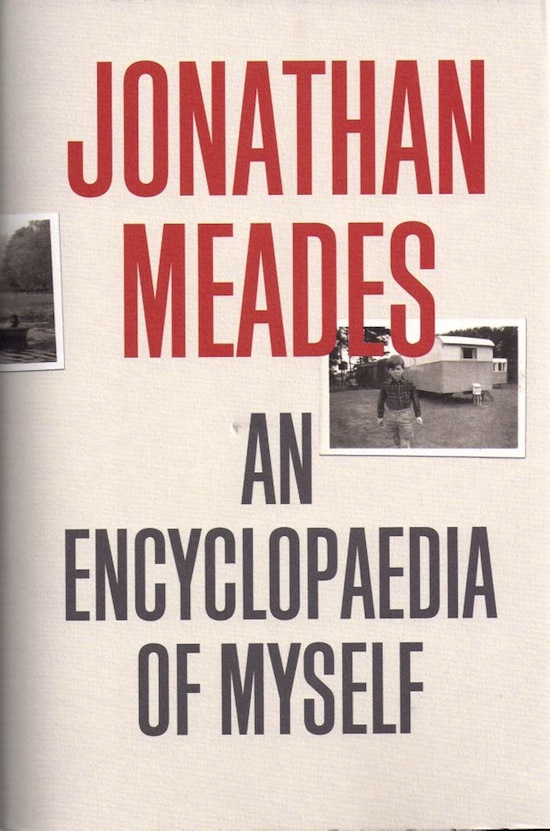Photograph by Martha Warner
The key scene of David Lynch’s Blue Velvet – if not his entire career – is that of a perfectly tended, all-American garden; immaculate roses, white picket fence, tidily mown lawn. Yet just millimetres under this illusion of utopian, suburban conformity there is an immense insectile world of violence that seethes with chaos. The point is clear enough. Another just so length of turf primed to be rolled back and have the hissing, writhing humus under the sod laid bare is that of 1950s England. And the imposing figure holding the spade in this instance is none other than Jonathan Meades.
It should be said however that this isn’t TV’s Mr Jonathan Meades of Abroad Again In Britain, Off Kilter, The Joy Of Essex and many other instances of peak television. That Meades is the implacable, hang dog, surreal, slightly austere, often enlightening, very entertaining construct of an ultra-presenter. No, this Meades – the cartographer of his own childhood – is, one would assume, a bit closer to the real thing. This is the boy in short trousers, being remembered by the callow RADA student, in turn being remembered by the ex-pat writer and broadcaster. (He is smart enough not just to reflect on his own childhood in a unique and engrossing way but to also acknowledge how these reflections themselves, have reached him as a 67-year-old writer via various staging posts, with attendant distortions, along the way.) The author of this book, The Actual JM (unlike New Labour, The Real Ghostbusters or The Contingency IRA) might genuinely be the real thing, but I guess we’ll never know. It’s not that important. What is important is that The Actual JM is less surreal, implacable and austere but just as enlightening and entertaining, simply in subtly different ways.
And of course he’s not the first writer to point out that the 1950s weren’t all that ‘boring’ or ‘prim and proper’ or ‘beige’; he just happens to be one of the best. Up there, in fact, with that other pre-eminent television man of his generation, the Dennis Potter of The Singing Detective. The 1950s that The Actual JM recalls is one of pre and post-pubescent sex, drugs (mainly the then legal LSD being tested by friends of the family in Porton’s hush hush military scientific facilities), war (of the cold variety) and death. And, oh but the death count is phenomenal. An Encyclopaedia Of Myself is not so much like a Jacobean Tragedy as it is like the opening twenty minutes of Saving Private Ryan, except set in Salisbury and dressed in threadbare tweed and not on the blood soaked beaches of Normandy. You start to suspect that the euphemistic way that death was treated with in the post war decades was perhaps one of the most vital, life and sanity-preserving strategies adults of that generation had at their disposal.
The unfortunate drowners, the determined suicide cases, the misadventurous alcoholics, unseated horse riders, the mown down cyclists, the upturned skiff steerers, the careless car crashers, the unfortunate sarin and bubonic plague exposees… there is a veritable parade of briefly met characters shuffling off the coil one by one with unseemly haste to join the majority. The sheer number that death undoes here would have made Graham Greene blanche. (In Greene’s bracingly charmless 1971 autobiography A Sort Of Life he claimed that as a ten-year-old boy recovering from appendicitis, he eavesdropped on the final moments of several other children on his ward and the subsequent grief suffered by their families. Greene infamously claimed that a writer had to have a splinter of ice in his heart in order to properly record these events.) The Actual JM is forensic in his recollection of these deaths (or hearing about them at least) and while some of these incidents are described in an amusing way, few of them are recalled without compassion. Through extensive practice here he reveals Greene’s (try hard) maxim to be essentially untrue.
The Actual JM (child version) observes death because all young boys are fascinated by the subject (not just the ones who weirdly realise they want to be novelists at the age of ten) but also because he has to as his father won’t.
"Death might go dogging everywhere but how was I to know? Intelligence of the final finality was only grudgingly vouchsafed me by my parents. For all they spoke of death, I might have believed that we live perpetually, growing ever more crooked, more and more dried up, more rasping, more fearful. (I obviously didn’t know that it was death’s proximity that caused the eyes of the very old to communicate unimaginable terror.) Did my parents talk of it in camera where the renchild could not hear? I doubt it. It hurt my father too much to consider it. Death was denied by near silence: what was not spoken of did not exist. So it was not addressed, nor were dying and the invisible invaders which honeycomb this internal organ or make leather of that one. The names of dead were dropped from conversation, as one might drop that of a disloyal friend. Death seemed to be a kind of disgrace."
TV’s Mr Jonathan Meades
Of course it’s not all LSD and bereavement, there is a lot of the quotidian stuff in there as well but it’s never a chore to read because The Actual JM is never anything less than a joy to read. There is an essay by George Orwell (yeah, you know the one) which is often boiled down, unhelpfully, to a set of six rules to form the basis of every style guide of every newspaper, journal, magazine and freesheet currently in existence. In a perfect world, it would be the essay in total which was reprinted and followed to the letter. As it is, it’s just six rules out of context which very few non-fiction writers have the time, skill or inclination to follow. (And even if they claim to follow them, they often invoke the get out clause, vi – "Break any of these rules sooner than say anything outright barbarous.") Put simply, it obviously takes a huge amount of self-discipline to construct every single sentence, word by painstakingly chosen word, with one unwavering eye always on complete originality. This is unsurprising as it seems to be a thankless skill most of the time anyway. It’s a cornerstone of the non-fiction writing of Martin Amis but when was the last time any of this impressed his readership? Will Self – an accomplished and highly individual non-fiction writer – also constructs his work with a violent originality but it’s as if he’s misunderstood rule number vi and can only write barbarous sentences. Don’t get me wrong, I admire Self’s non-fiction style but if his prose were inclined to go to a nightclub, it would go and stand on its own. And leave on it’s own. And it would go home and cry and want to die. In fact sometimes when I’m tackling a particularly exuberant and knotty paragraph of his and yet again I’m having to interrupt the actual reading to reach for a reference book (and everyone bar his vocally self-satisfied fans have to), I think of a quote often attributed to Tom Waits. The motto: "A gentleman is someone who knows how to play the accordion but doesn’t" could be usefully updated for non-fiction writers but with the notion of using a thesaurus replacing that of playing the accordion. Perhaps his style has a passing similarity to that of Iain Sinclair – they both love a well constructed list for starters – but Meades hasn’t succumbed to angry dyspepsia in the same way.
Meades’ prose, as I said, is a joy to read as well as being savagely well constructed. ("Joy to read" being the kind of congregation of words that would have Orwell spinning in his grave. "Spinning in his grave", being another.) Even the opening page will have you punching the air, or the person next to you, with happiness. His opening gambit is to apologise to the reader for the fact he wasn’t sexually abused as a child. He apologises for the lack of a "simpering, gingivitic distant cousin with crinklecut hair who beseeched [him] to come and play with a special mauve toy". He apologises for the lack of a "wispily moustached, overfriendly, oversweaty ‘friend-of-the-family’ whom [he] was made to address as aunt, who tucked [him] up then, who must be hunted down now". He apologises for the lack of a "doddering nonagenarian former ‘magician and children’s entertainer’". He apologises for the lack of a "lissom-fingered groin-pirate" or "failed oboist".
All of which brings me to another point. The Actual JM isn’t what you’d call a politically correct writer but that isn’t to say he’s one of those arse-hats who complain voluably about political correctness cramping his style either. Scratch the latter and invariably you’ll find a (white, able-bodied, affluent, hetrosexual) man who misses being able to speak his mind like he could in the company of like minded men in 1974. Meades on the other hand simply wants you to see things from a different perspective. (His opening gambit, of course, has little to do with paedophilia and everything to do with the nature of the modern, confessional, celebrity autobiography.) The Actual JM is treating you like an adult and leaving you to make your own mind up. Luxurious.
He walks the line when it comes to all discussion of his family. His descriptions are funny, blunt, sometimes distressing, not always flattering but ultimately because of this frankness sometimes very warm, true and touching. He is, above all else, very honest in what he’s writing – even when revealing the workings of his writing.
"Nostalgia is not simply a yearning for a lost home, a yearning which can never be satisfied by revisiting that home, which could only be satisfied by becoming once more the child who inhabited that home, at that time. It is also primitive, pre-rational, pre-learning. It quashes developed taste, aesthetic preference, learnt refinements. It insists that the chance associations of infancy are more obstinately enduring than the chosen positions of our subsequent sentience. It tells us that we are lifers in a mnemonic prison from which there is no reprieve."
What a great book.



